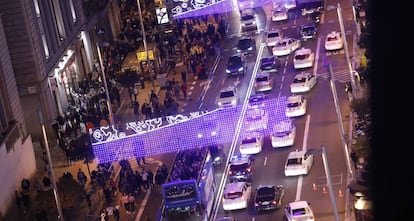Madrid City Hall announces plans to close “Spanish Broadway” to traffic
Restrictions will be put in place on Gran Vía during Christmas holidays, before permanent measures coming in June

Madrid’s Gran Vía will be closed off to private traffic starting next June, with “partial closures” beginning this Christmas. That’s according to city planning councilor José Manuel Calvo, who confirmed last week that the redesign of the street – known as the “Spanish Broadway,” thanks to its stores and theaters – will see traffic lanes reduced and sidewalks extended. The measure is part of Mayor Manuela Carmena’s plan to combat the high levels of pollution in the city.
Initially, on Wednesday the council announced that the full closures would begin at Christmas, but City Hall later backtracked stating that only “partial closures” will begin during the holidays as construction work begins.
“It would not make much sense to reopen Gran Vía to traffic after the Christmas closures when construction starts a month later,” said Calvo. “What we will do is maintain that structure so that the companies that will do the work can begin to operate.” The actual sidewalk expansion will not begin until early 2018 and private traffic will not be fully restricted until the summer. Further restrictions will be announced as the renovation progresses.
By 2020, the city expects to reduce pollution by 25%
The new configuration of Gran Vía, from Plaza de España to its convergence with Alcalá street, provides for two lanes in each direction, one for the traffic of authorized vehicles (residents and deliveries) and another for public transportation and bicycles. The remodeling of this street will become one of the Carmena administration’s legacies. The modification of one of the capital’s most emblematic streets will cost €5 million.
Gran Vía “will be a much friendlier, very green street with spaces to sit and enjoy and to give priority to pedestrians,” said the councilor for sustainable urban development on Wednesday during an interview with the Onda Madrid radio station.
The new Gran Vía is part of the the new residential priority area, which will also be launching in June 2018. The aim of the Carmena government is to turn the heart of the capital – where there are high nitrogen dioxide levels – into a low-emission area. By 2020, the city expects to reduce pollution by 25%.
With this closure, traffic will be reduced by 80%, from 50,000 to 10,000 vehicles a day. As for drivers, the councilman said, “they will have to look for alternatives,” because “in no city in the developed world can cars cross the center.”
Expanded sidewalks
The announcement last week prompted criticism from the opposition. Popular Party councilor José Luis Martínez-Almeida said that the restrictions will create “considerable traffic jams” and criticized the fact that the government had not consulted with residents and local businesses. “The only thing they know how to do is to impose bans,” he said. Spokeswoman for center-right party Ciudadanos, Begoña Villacís, played down the impact of the measure, saying: “This is not a big city project, much less, it is just a project to expand sidewalks,” said Villacís.
Socialist Party (PSOE) spokesperson Purificación Causapié stressed that if well implemented, the measure would be “beneficial to reduce pollution.” But she called on City Hall to “adequately inform neighbors, businesses and professionals” affected.
In no city in the developed world can cars cross the center of the city Councilor Jose Manuel Calvo
A spokesperson for the Chueca neighborhood association said that the municipal government had not informed them officially about when the work will be done. However, they defended the measure, but also had some concerns: “The biggest worry we have is that Gran Vía becomes a large terrace. This would mean turning Gran Vía into a great big theme park, and it would affect the habitability of the area.”
English version by Debora Almeida.
Tu suscripción se está usando en otro dispositivo
¿Quieres añadir otro usuario a tu suscripción?
Si continúas leyendo en este dispositivo, no se podrá leer en el otro.
FlechaTu suscripción se está usando en otro dispositivo y solo puedes acceder a EL PAÍS desde un dispositivo a la vez.
Si quieres compartir tu cuenta, cambia tu suscripción a la modalidad Premium, así podrás añadir otro usuario. Cada uno accederá con su propia cuenta de email, lo que os permitirá personalizar vuestra experiencia en EL PAÍS.
¿Tienes una suscripción de empresa? Accede aquí para contratar más cuentas.
En el caso de no saber quién está usando tu cuenta, te recomendamos cambiar tu contraseña aquí.
Si decides continuar compartiendo tu cuenta, este mensaje se mostrará en tu dispositivo y en el de la otra persona que está usando tu cuenta de forma indefinida, afectando a tu experiencia de lectura. Puedes consultar aquí los términos y condiciones de la suscripción digital.








































